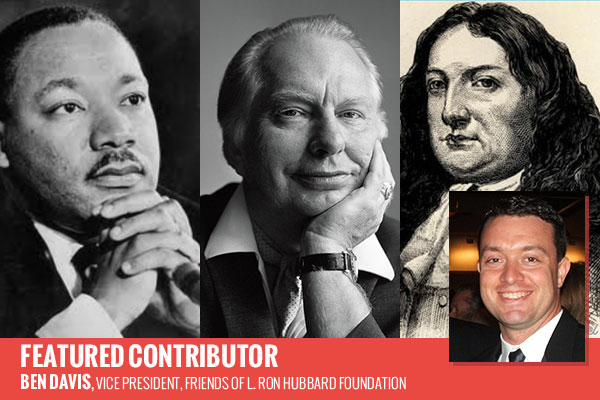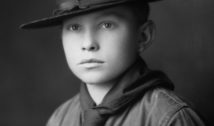
Kindness Inspired by Great American Religious Leaders
- By Ben Davis --
- 16 Feb 2017 --

Three great religious leaders who inspire random acts of kindness to this day.
Individuals and groups across the U.S. are celebrating Random Acts of Kindness Week. February 12 – 18 to demonstrate that kindness is contagious, encourage people to leave the world better than they found it and inspire others to do the same.
Kindness Inspired by Great American Religious Leaders[/tweetthis]
In looking at the purpose of Random Acts of Kindness week, I was particularly struck by three of these men, whose legacy continues to better the lives of others to this day: Dr. Martin Luther King Jr., L. Ron Hubbard and William Penn.
Dr. Martin Luther King Jr.
Dr. Martin Luther King Jr. is a name synonymous with American civil rights and compassion for others regardless of race or creed. Dr. King adopted a policy of nonviolent resistance, convinced this was the way to secure civil rights for all African Americans. King’s speeches were filled with his message of kindness: “The time is always right to do what is right,” “Life’s most persistent and urgent question is ‘What are you doing for others?’” “Darkness cannot drive out darkness; only light can do that. Hate cannot drive out hate; only love can do that.” In Montgomery, in Selma, in his March on Washington, the Nobel Peace Laureate lived what he preached. In keeping with his beliefs, the day named in his honor is Martin Luther King Jr. Day of Service.
L. Ron Hubbard
Well-known as the author of Dianetics: The Modern Science of Mental Health and founder of the Scientology religion—the only major religion to emerge in the 20th century—Mr. Hubbard was a humanitarian in the fullest sense of the word. As he once stated, “I like to help others and count it as my greatest pleasure in life to see a person free himself of the shadows which darken his days.” Mr. Hubbard interacted with numerous cultures at a young age. With a formal education in mathematics, engineering and nuclear physics, he went on to research mankind and life with scientific exactitude. Before his passing in 1986, he gave the world effective programs in education and literacy, drug rehabilitation and criminal reform, and authored a nonreligious moral code—the first to be based wholly on common sense. The Way to Happiness has been distributed in 115 languages in 186 countries. Mr. Hubbard’s life and work were dedicated to the fulfillment of the Aims of Scientology: “A civilization without insanity, without criminals and without war, where the able can prosper and honest beings can have rights, and where Man is free to rise to greater heights.”
William Penn
Born in October 1664, William Penn founded the British colony of Pennsylvania on religious tolerance and democratic principles in an era when religious persecution and tyranny were the order of the day. Born to a distinguished Anglican family, Penn joined the Religious Society of Friends, or Quakers, and found the persecution he and his fellow Quakers experienced to be so intense, he decided to found a Quaker settlement—the Province of Pennsylvania in North America. He implemented a democratic system including freedom of religion, fair trials, elected representation and separation of church and state—principles later incorporated in the U.S. Constitution. As word of its policy of religious tolerance spread, Pennsylvania became the destination for others who were persecuted for their faith: English, Welsh, German and Dutch Quakers, Huguenots (French Protestants), Mennonites, Amish, and Lutherans living in Catholic German states.
To this day, these religious leaders inspire random acts of kindness by those who model their actions on the principles that defined their lives.



















